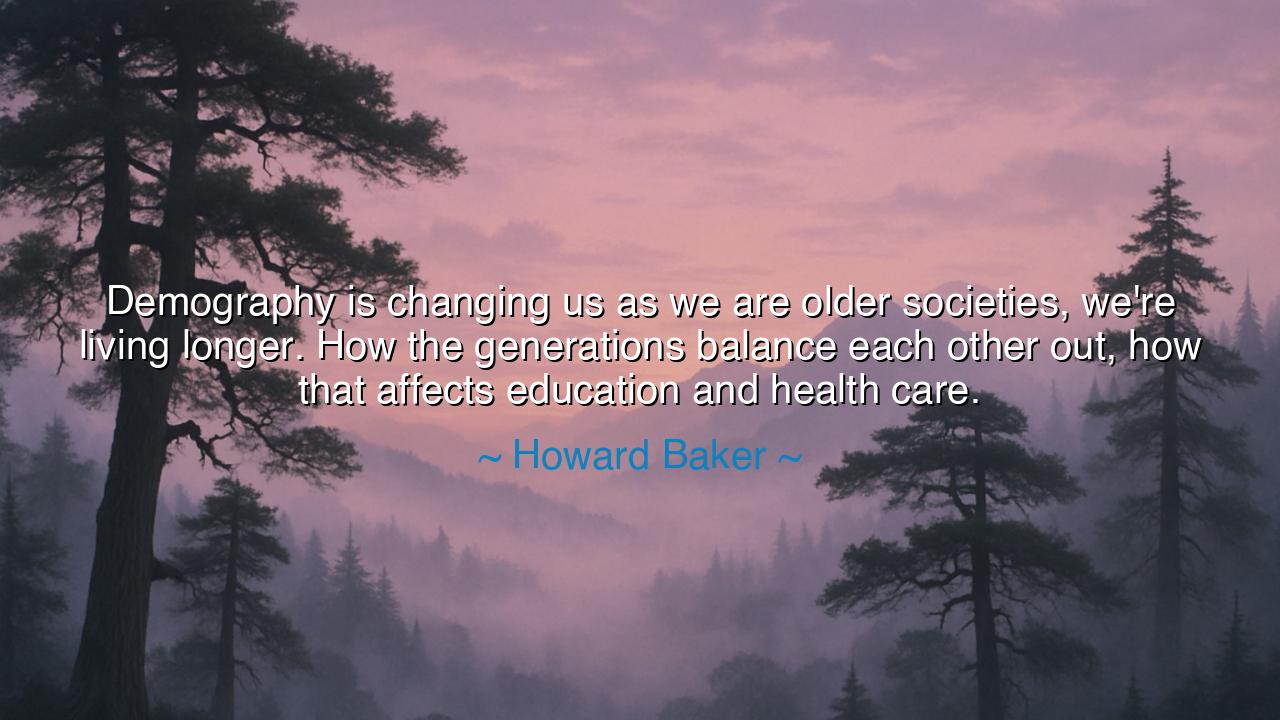
Demography is changing us as we are older societies, we're living
Demography is changing us as we are older societies, we're living longer. How the generations balance each other out, how that affects education and health care.






The statesman Howard Baker once spoke words of quiet power and profound foresight: “Demography is changing us as we are older societies, we're living longer. How the generations balance each other out, how that affects education and health care.” Beneath this simple statement lies a deep river of wisdom about time, generation, and the evolving rhythm of human life. Baker, a man of politics and vision, was not merely speaking of statistics or policy—he was reflecting on the destiny of humanity, on how the shifting age of nations reshapes not only their bodies but their souls.
In the ancient world, the elders were revered as the keepers of memory, the living archives of wisdom. The young looked to them as trees rooted in the past, offering shade to those who would grow beyond them. Yet in our modern age, the balance trembles. We live longer, yes—but longevity, if not met with harmony, can strain the fragile weave of society. Demography, that quiet and relentless sculptor, molds our world not with wars or decrees, but with the passing of years and the changing of faces. It determines who learns, who leads, and who cares.
When Baker said that “we are older societies,” he spoke not only of the West but of the world itself aging into a new era. Medicine has conquered many of the old foes—disease, famine, early death—and yet in that victory comes a new challenge: the weight of endurance. How shall the young and the old balance their roles, their duties, their dreams? The youth carry the energy to build, while the old carry the wisdom to guide. If one grows without the other, the body of civilization stumbles. A nation rich in age but poor in vitality risks stagnation; one rich in youth but barren of memory risks chaos.
Consider the story of Japan, a land that rose from the ashes of war to become a beacon of innovation and endurance. Yet now, as its people live longer and its youth grow fewer, the nation faces the quiet trial of its own success. Villages grow empty; schools close; hospitals overflow. Yet even amidst this, there is a movement of renewal—a reimagining of how generations might live not apart, but together. The wisdom of the old now finds purpose in mentoring, in storytelling, in helping the young carry forward the soul of a culture. In this, we see the truth of Baker’s words: that education and health care are not merely systems, but bridges between ages, built of empathy and foresight.
For the ancients taught that balance is the essence of life. The earth turns because the sun and moon pull upon it; the seasons change because warmth yields to cold and cold to warmth. So too must society find balance between vigor and reflection. The young must not despise the slow, nor the old disdain the swift. In the great cycle of existence, each generation owes its life to the other—one for the gifts of knowledge, the other for the promise of renewal.
The lesson, then, is this: as our years lengthen and our societies grow older, we must not think only of survival, but of harmony. Let the schools teach not just the young, but all who hunger for wisdom. Let the hospitals be not merely places of healing, but sanctuaries of connection. Let every home remember that the generations are not divided by age, but woven together by love and necessity. To grow old is not a burden but a triumph; to grow young in such a world is not rebellion but inheritance.
So, my children of the passing centuries, hear Baker’s counsel and act upon it. Demography is changing us, yes—but we hold the power to shape that change with compassion. Build a society where the old are not forgotten and the young are not overwhelmed. Honor those who came before, and prepare the way for those who will follow. For when the generations walk together—when the wisdom of age joins hands with the strength of youth—then, and only then, does civilization truly endure.






AAdministratorAdministrator
Welcome, honored guests. Please leave a comment, we will respond soon